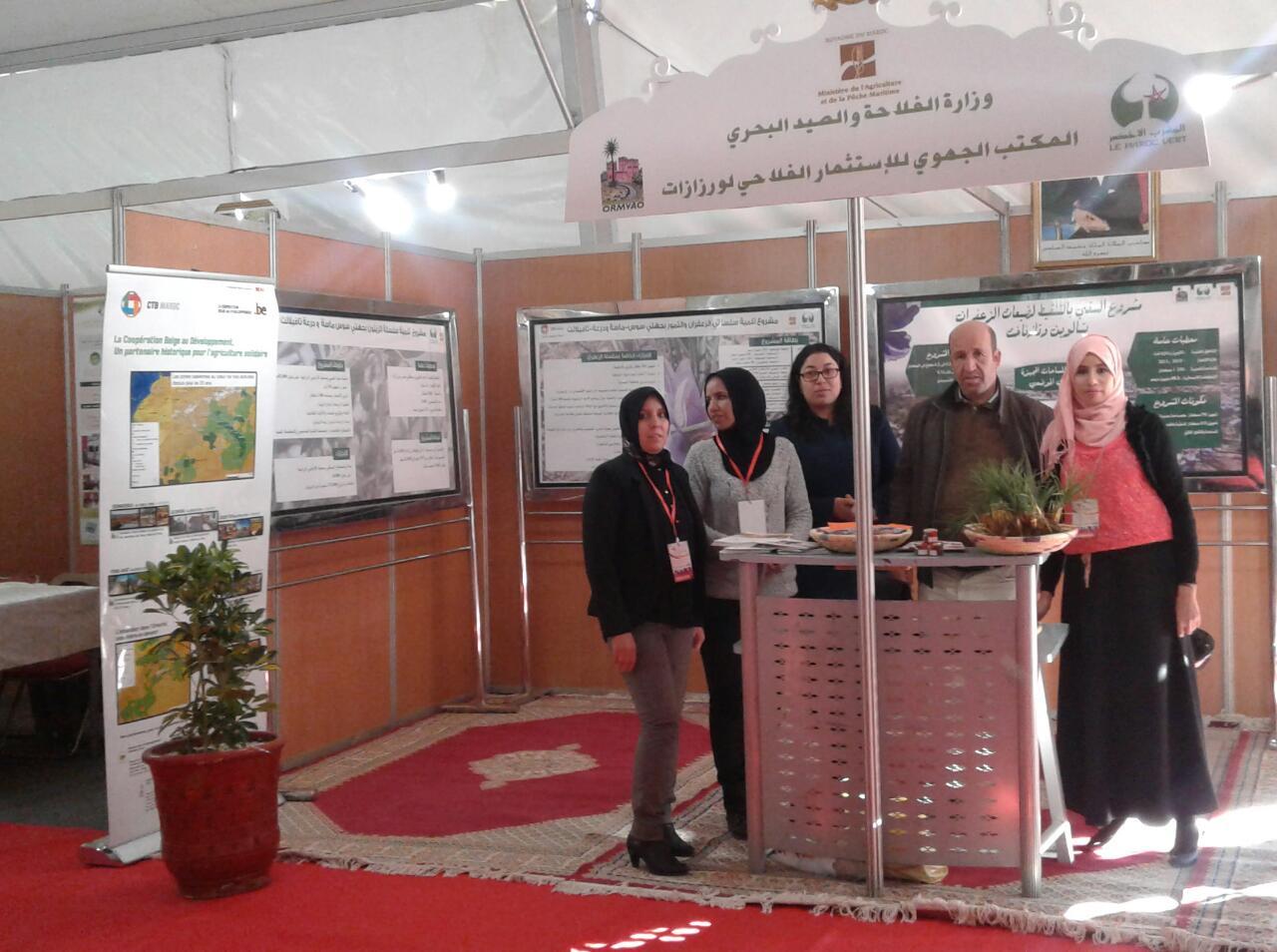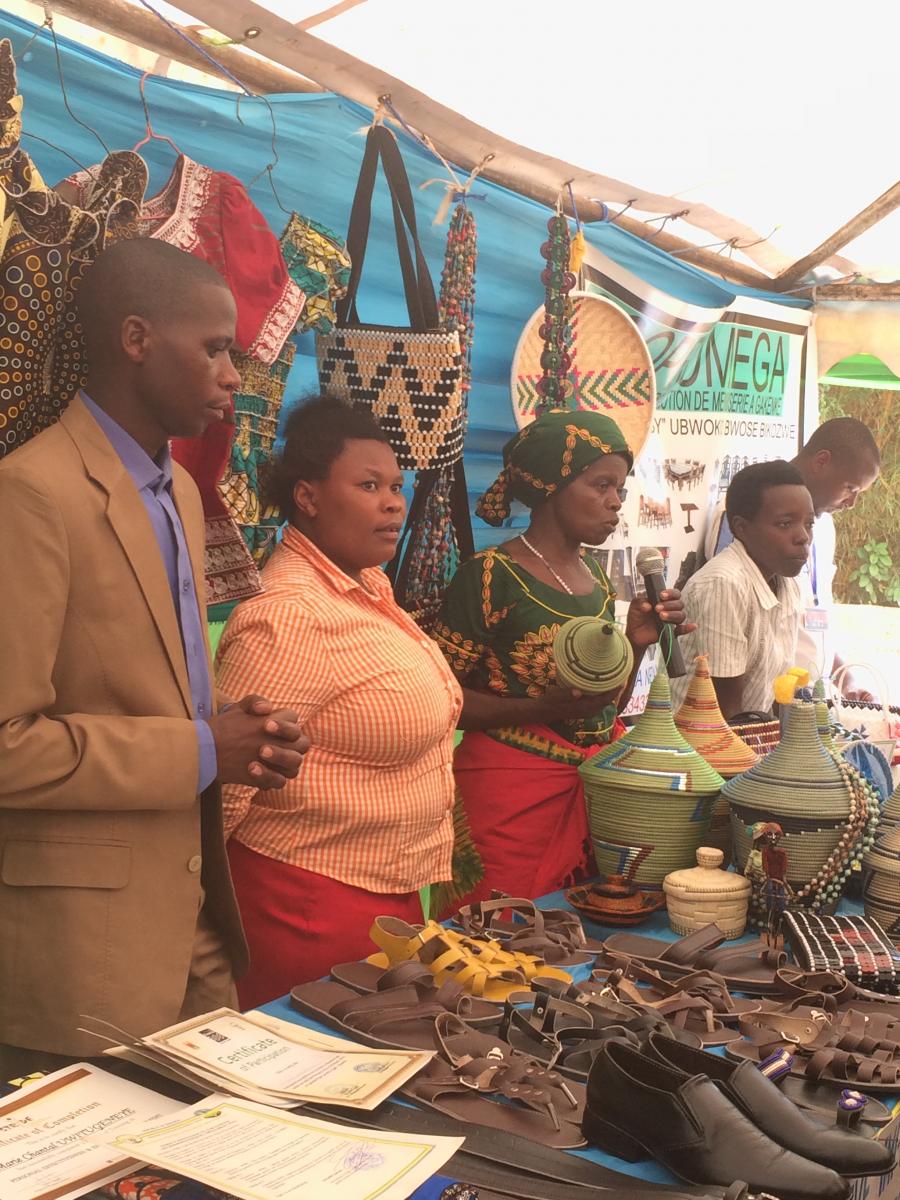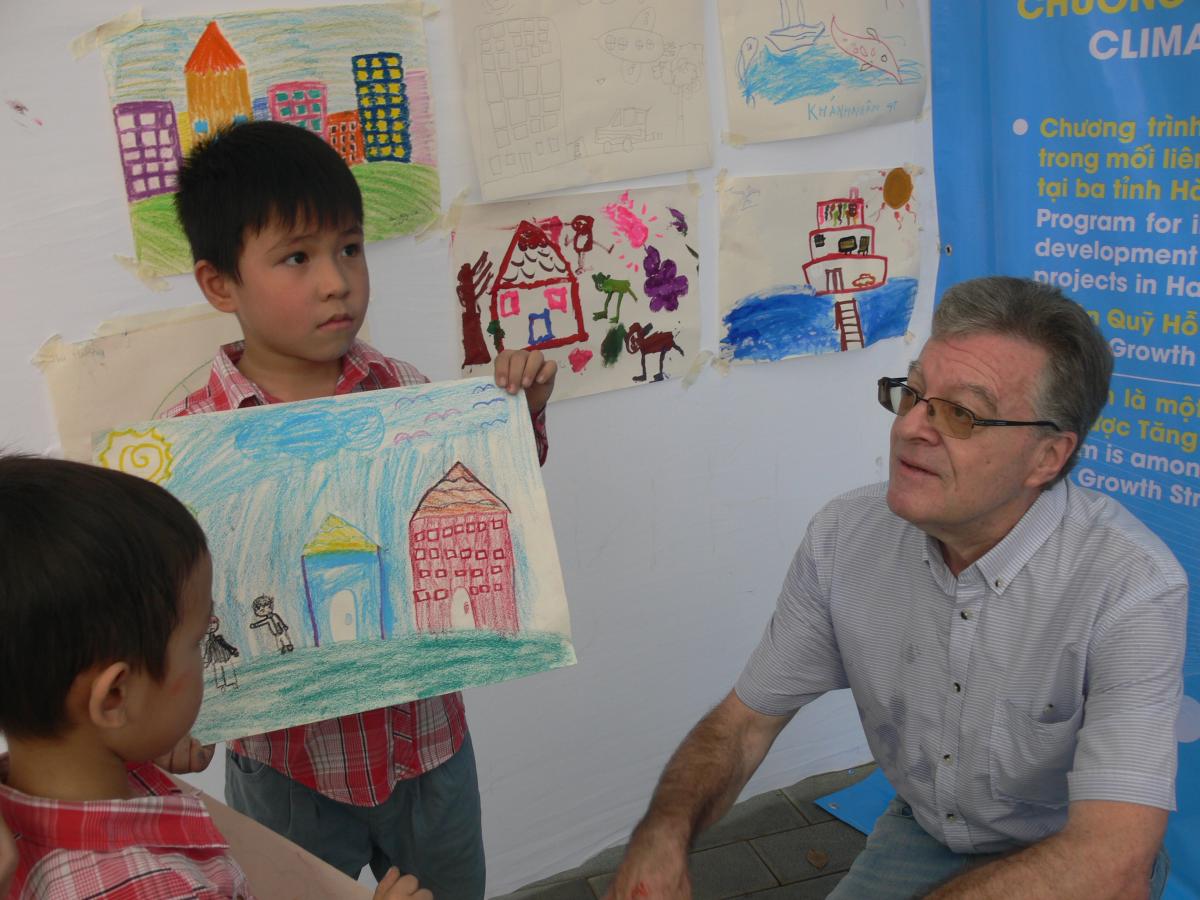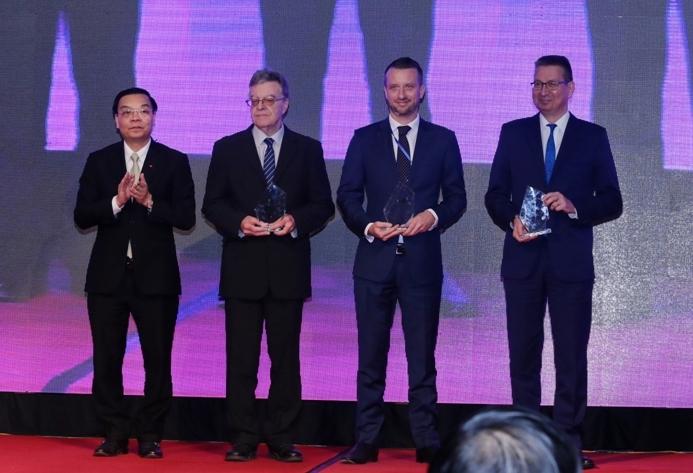Opzoeken
2325 - 2340 van 2520 nieuws bekijken
-
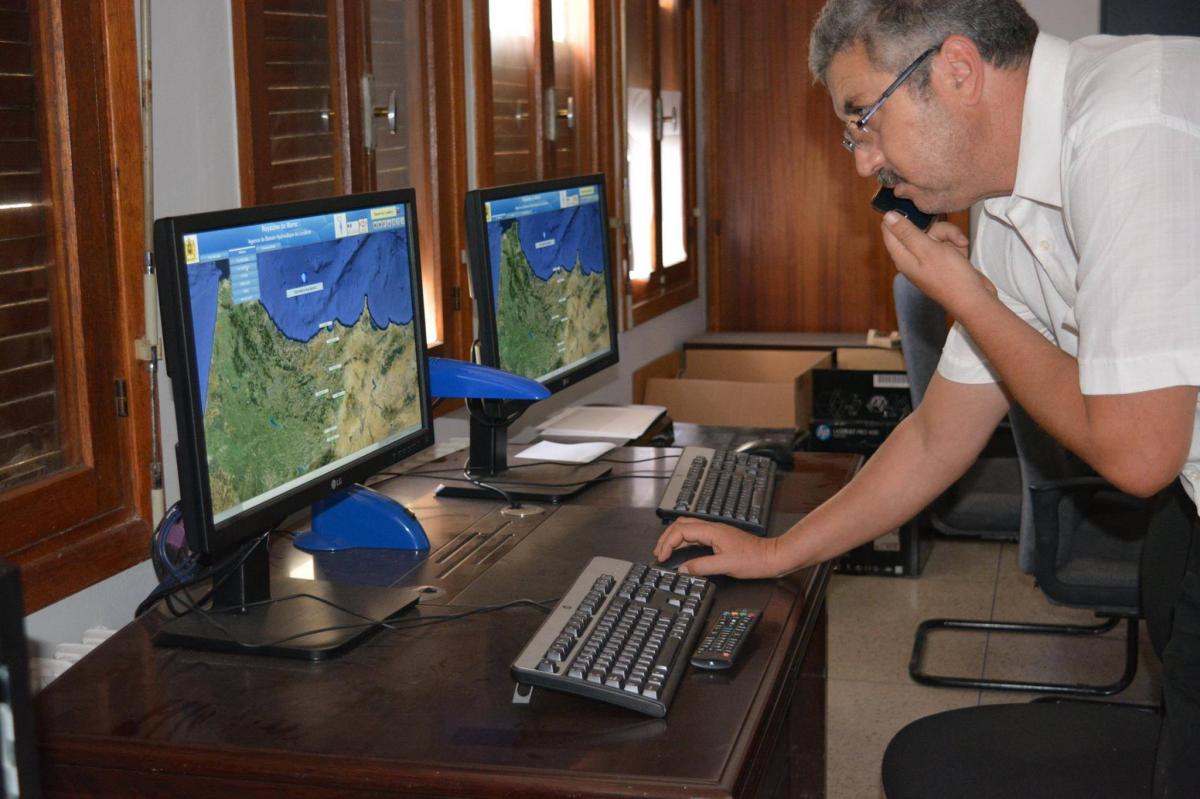
Un dispositif pour prévenir les risques d'inondations
Meriem HILALI | 29/11/2016
Financé par la Coopération belge, le système d'annonce des crues dans le bassin du Loukkos au nord du royaume est désormais opérationnel. Le total des investissements de ce projet se chiffre à 2,3 millions de Dirhams. L'Agence de bassin hydraulique du Loukkos (ABHL) complète ainsi son réseau avec ce dispositif de télétransmission (réseau de radars reliés à un serveur central) capable de fournir la situation hydrologique des grands oueds avec précision et en temps réel dans le bassin de Neckor. Les informations sont retransmises instantanément au poste de contrôle provincial et central afin d’assurer la sécurité des populations, et limiter les dégâts matériels. A rappeler que la région de Tanger-Tétouan-Al Hoceima au nord du Maroc est parmi les zones les plus vulnérables aux crues rapides et torrentielles. Depuis le début des années 2000, des crues de grande ampleur s’y sont succédé: Tétouan 2010, Tanger 2008, la plaine d'Oued Martil (2000), Al Hoceima (2003 et 2008) et, plus récemment, l’amont de l’oued Martil en 2015.
-
Un festival pour promouvoir la filiére du safran
Meriem HILALI | 29/11/2016
Les 26 et 27 novembre dernier, à Taliouine au sud du Maroc, a eu lieu comme chaque année le Festival du Safran, qui a pour objectif de promouvoir la région et de favoriser la commercialisation du safran, dans le but d’améliorer les conditions de vie des populations rurales. Cette édition intervenait, pour rappel, après la tenue du 5ème Symposium sur le Safran (du 23 au 26 novembre à Agadir), organisé quant à lui par le Ministère de l’Agriculture et de la Pêche Maritimes et la Société Internationale des Sciences Horticoles. Lors de ces deux manifestations, le projet belgo-marocain de Développement des Filières du Safran et du Palmier-dattier a mis l’accent sur deux points importants, à savoir l’influence de la composition des sols et des méthodes de séchage sur la qualité physico-chimique du safran, ainsi que les résultats préliminaires de l’étude de positionnement du safran marocain sur le marché national et international.
-
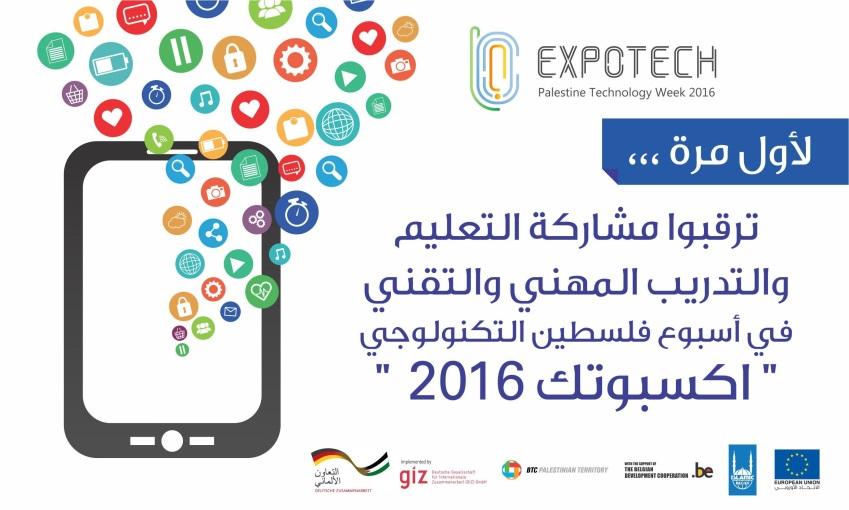
Expotech: a yearly event to promote the ICT sector
Eva MORRE | 28/11/2016
The Palestinian Information and Technology Association (PITA) is a non-profit organisation founded in 1999 by a group of Palestinian entrepreneurs with the objective of advancing the interests and the positive societal impact of Palestine’s Information and Communication Technology (ICT) sector. PITA organises an annual event called ‘EXPOTECH’ in the West Bank and Gaza. It succeeds to gather more than 20.000 visitors each year. The objective of the EXPOTECH is to promote the ICT sector in Palestine and to serve as a vehicle for discussing state of the art technological trends both locally and globally. The main components of this event are the ICT Exhibition and the IT Conference Days. In addition, there are a Business and Technology Forum, Multinational Days, a boot camp for ICT graduates from the technical and vocational education and training (TVET) and many more activities. The Palestinian ICT exhibition welcomes more than 45 Palestinian professional companies that are specialized in the field of ICT. It is designed to demonstrate the exceptional growth of the ICT industry in Palestine by showing the latest technologies, innovative solutions and services from Palestinian national suppliers. This ICT event gives the exhibitors and the audience both the opportunity to meet new ICT companies in the market and to see the latest updates from market experts. Several recent studies show the high growth potential of the ICT sector in Palestine. Taken into account the current level of youth unemployment, the further development of the ICT sector will significantly contribute to a decrease of youth unemployment. This employment potential is not limited to jobs for university students but encompass also TVET graduates with an ICT training. Therefore, the Belgian Development Agency (BTC) is actively participating in the Expotech 2016, both in the West Bank and in Gaza. In Gaza we focus on the benefits of employing graduates from the TVET sector in ICT companies. Expotech offers a unique forum to promote the high employment potential of TVET in ICT, to improve the perception of the potential of TVET and to strengthen the relationship between the private sector and TVET institutions in the ICT sector. In the West Bank our focus is mainly on stimulating entrepreneurship among young people. It is important that young people realise they have the potential to create their own job, by focusing on self-employment opportunities. Therefore, BTC tries to enhance the entrepreneurial mind-set amongst recent graduates.
-
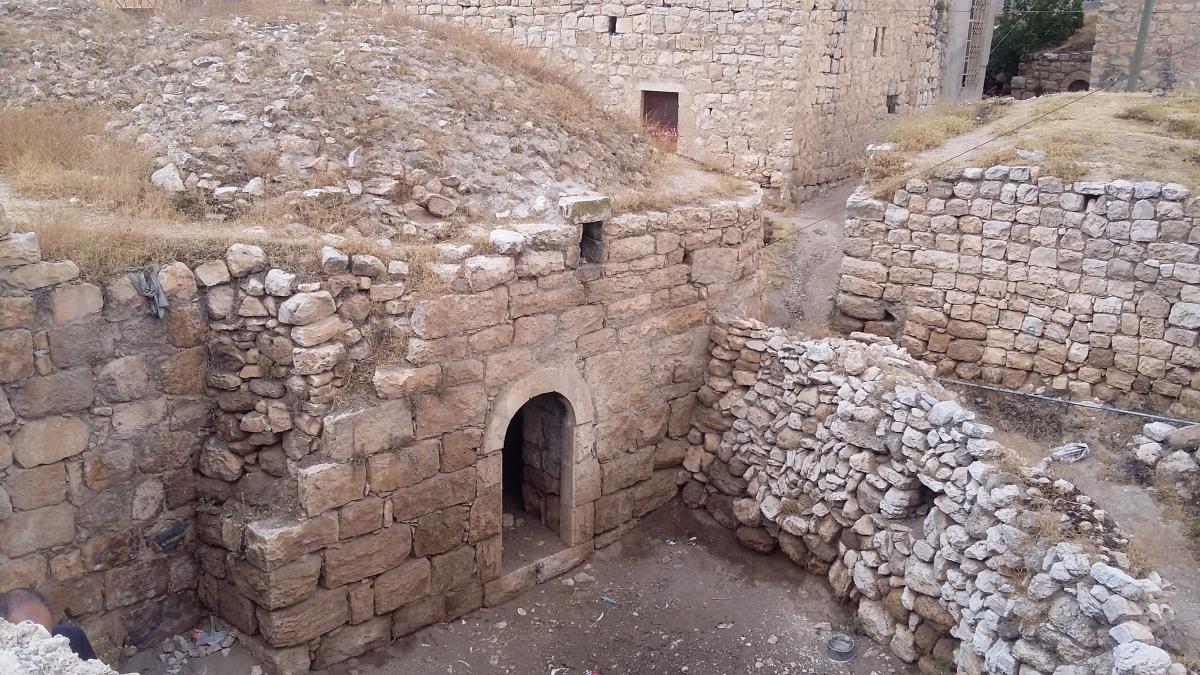
Quick fruit projects as the first step towards the revitalization of historic centers
Eva MORRE | 24/11/2016
Preservation and restoration of cultural heritage is one of the crucial dimensions of state- and nation-building. In a context of occupation, separation, fragmentation, and limited national planning power, the Palestinian identity is often the only handhold for Palestinian citizens. However, the occupied Palestinian territory is marked by a sharp deterioration of its architectural and cultural heritage. This deterioration is based on several factors: the destruction related to the Israeli-Palestinian conflict; the abandonment of buildings due to ignorance and lack of interest of local populations; urbanization processes that do not consider traditional structures; and Palestinian laws for the protection of historic buildings that are ineffective.Most residents living in the historic buildings are poor. They are often tenants, perceived as those who don’t have the means to move to modern cities or urban extensions, reinforcing the idea that historic centers and people living in them are backward.[1] The Belgian Development Agency believes that by 'Regenerating [2] Historic Centers in Local Government Units' (RHC), and with the involvement of local stakeholders, we could generate a new dynamic in the state-building process. The program supports the regeneration planning, practice and policy development in the Palestinian Territory. The integration of the protection and development of Historic Centers in Local Governments combines three key national strategic priorities:Supporting Palestine’s historical cultural significance;Integrated planning processes; andLocal economic developmentA participatory approach towards regeneration The RHC project supports twelve (small and medium-sized) Local Government Units (LGUs) in the West Bank, and is designed to address the regeneration planning, practice and policy development in these areas. In the first step of the process, a team, consisting of representatives of the local authority, the private sector, local organizations and the community, was formed to analyze and review existing planning documents (Strategic Development and Investment Plan, Spatial Development Framework, the National Spatial Development Plan, etc.). Secondly, two workshops, with a wide community participation, were held to develop a community vision and strategic objectives. In the first workshop the elderly of the village told stories about the old social (weddings, festivals, etc.) and economic (trade, transportation, agriculture, etc.) traditions of the village. During the second workshop, focus groups determined the potential development areas for regeneration. At the end of the workshops a regeneration program was proposed. This community-participation and consensus-building output was complemented with a survey and a diagnostic study of the current social, economic, physical and cultural condition of the historic center and its citizens. To ensure the sustainability and viability of the regeneration plans, preliminary feasibility assessments and business plans were developed in a second phase.Quick Fruit Projects Not all of the twelve localities will be targeted at the same time. To enable learning from previous experiences, five localities (Assira, Deir Istiya, Bani Zeid, ‘Abud and Bani Na’im) are listed as 'Quick Fruit Projects'. They have a pilot function for the seven remaining (and more valuable) localities. 'Quick Fruit Projects' are characterized by their quick return on investment. They are try-outs where a smaller amount of money is invested and where one can easily and quickly see the output, results and impact. Moreover they provide lessons learnt for the remaining projects in other localities.The Center for Cultural Heritage Preservation (CCHP) in Bethlehem has been contracted to design and technically supervise the implementation of those quick fruit rehabilitation projects. Their work focusses on preserving the authenticity of the building and maintaining the integrity of the urban fabric where it is located, while at the same time transform it to host socio-economic functions or services. These new functions were defined through a participatory approach and meet the needs of the local community as well as potential local and international visitors. Assira: The project includes the rehabilitation of a traditional abandoned building composed of two floors with a total surface area of 200 m² for the adaptive reuse as an agricultural craft center. Secondly, the pathway adjacent to the building (around 100 m²) will be rehabilitated.Deir Istiya: The project includes the rehabilitation of a traditional abandoned building (Qaser Al Qasem) composed of three floors with a total surface area of 1020 m². The building will be used as a guest house and restaurant. Bani Zeid: The project includes the rehabilitation of a traditional abandoned building (Dar Khatab) composed of two floors with a total surface area of 190 m² for the adaptive reuse as a multipurpose building, and the rehabilitation of 210 m² courtyard that connects the traditional building with its surroundings. ‘Abud: The project includes the rehabilitation of 600 m long pathway with an average width of 4 m that connects the town of ‘Abud with the Barbara Church. This church is known as the most important tourist site of the town. A second project is the rehabilitation of Samra square which has a total surface of around 560 m² and the upper square with a total surface area of around 220 m². Both squares will be reused as public squares for ‘Abud’s events and festivals. Bani Na’im: The project includes the rehabilitation of a traditional abandoned building composed of two floors with a total surface area of 1130 m² for the adaptive reuse of a handicraft center. Additionally, the pathway (130m) that connects the traditional building with the Mosque will be rehabilitated.The construction on site for each of the quick fruit projects will start in the first week of December, 2016. More pictures and drawings of the rehabilitation projects can be found here. [1] Tashgheel, Riwaq’s Job Creation through Conservation 2001-2011, Khaldun Bshara, Ramallah, 2011, p. 20 [2] Regeneration refers to the revitalization (making socially and economically alive again) of historically valuable buildings and compounds.
-
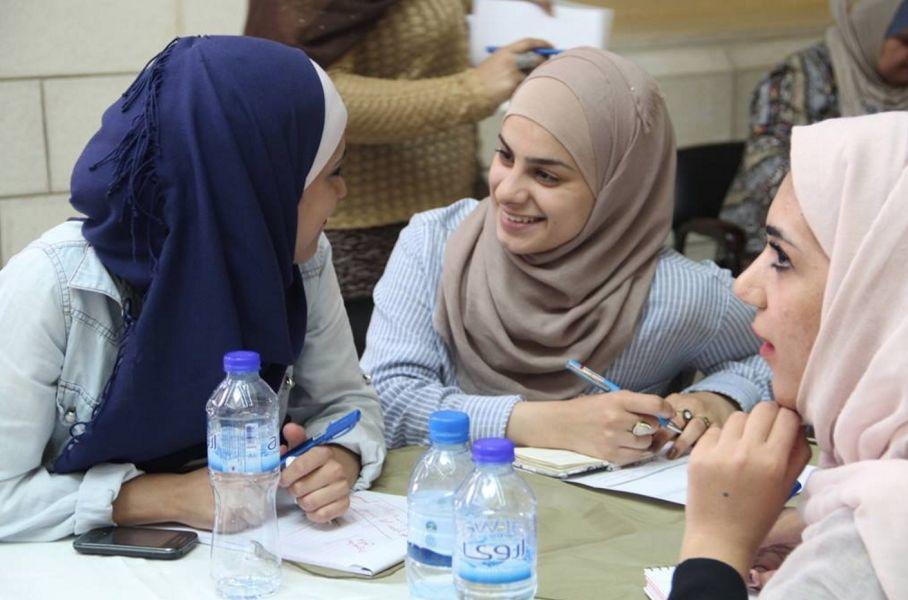
Supporting young entrepreneurs
Eva MORRE | 16/11/2016
The Business Startups Incubators Support project (BSIS) supports young Palestinian entrepreneurs to develop their ideas into viable businesses. Recently BSIS has organised a number of awareness sessions and bootcamps to promote entrepreneurship around the country. Sessions have been organised on different occasions in the major cities - Hebron, Nablus, Ramallah, Jerusalem, Bethlehem and Gaza - around the country. These meetings were an opportunity for young people to become aware of the available entrepreneurship opportunities across the Palestinian Territory. A more specific awareness session on the Tourism sector took place in Bethlehem. The focus of this session was the recent challenges the sector faces in attracting tourists to Bethlehem and in providing the desired services to them. After the brief explanation about the situation, the participants were given the time to ask questions to the members of the panel. At the end of the discussion, participants were asked to collect information on the problems and work on creating various solutions. Afterwards a Tourism Hackathon was organised in Bethlehem. This is a 2-days meeting aimed to tackling the challenges facing the tourism sector in the city, and help create solutions which can lead into solving the existing challenges. For those potential entrepreneurs who already have a concrete business idea, the BSIS project has organised bootcamps for Business Start-ups. These bootcamps consist of a 2-day training to help them transform their ideas into entrepreneurial start-ups. During the bootcamps the participants did market research, learned how to pitch their idea and how to develop their business plan. More information on the upcoming events of BSIS can be found on the project website: http://bsis.ps/events/ and the facebook page: www.facebook.com/BSISpal/
-
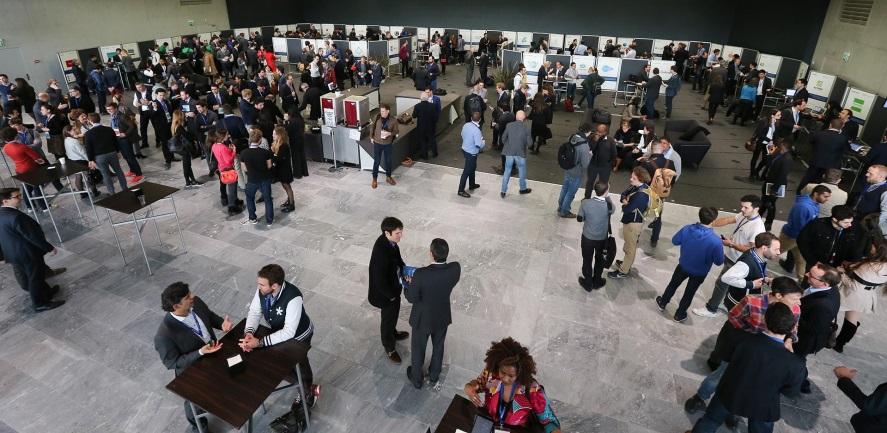
The BSIS website is now online !
Eva MORRE | 16/11/2016
BSIS – Business Start-up Incubators Support – supports the development of a dynamic and vibrant private sector through supporting Micro, Small and Medium Enterprises (MSMEs). Helping young entrepreneurs means giving them access to finance for their innovative ideas and projects. But it also means giving them easy access to all information that is relevant for developing their ideas into viable businesses. Therefore, the BSIS project has now created a website where potential entrepreneurs can find an overview of the different financial tools that are at their disposal. Furthermore, they can read different success stories of young entrepreneurs who have made it into a successful career. And they can directly contact different incubators willing to help them to further improve their own ideas. You can find the BSIS website here: http://bsis.ps/
-
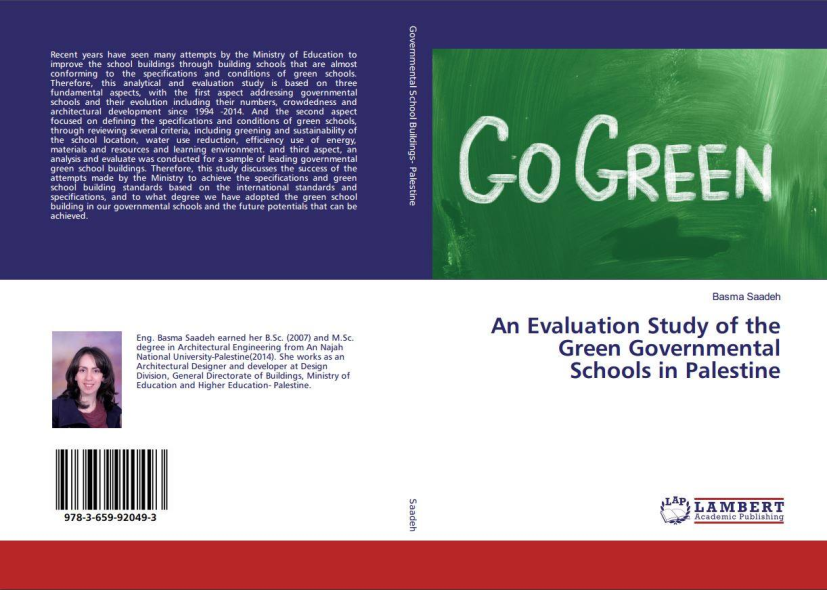
Go Green – An evaluation Study of the Green Governmental Schools in Palestine
Eva MORRE | 16/11/2016
The School Construction, Rehabilitation and Equipment project of the Belgian Development Cooperation builds new schools in the Palestinian Territory. The focus lies on quality education through environment and child friendly school designs, while experimenting with innovative and eco-sustainable solutions. In order to raise awareness, the project also invests in capacity building for engineers of the ministry of education and higher education, the directorates, school headmasters and teachers, students and communities. Special attention is paid to interactions between schools and communities, to gender and to energy efficiency and other environment-related aspects. One recent achievement in terms of environmental awareness, is the translation, supported by the Belgian Development Cooperation, of the book “An Evaluation Study of the Green Governmental Schools in Palestine “ of Basma Saadeh from Arabic to English. The book is divided into three main chapters. In a first part, the book gives an overview of the evolution of governmental schools in terms of student numbers and architectural development from 1994 until 2014. The second part of the book is dedicated to green schools, including aspects such as the sustainability of the school location, water use reduction, efficiency use of energy, used materials and resources as well as the learning environment. In the final part, an analysis was conducted of a sample of prominent governmental school buildings that can be classified as ‘green’. The study discusses the success of the attempts made by the ministry to achieve the specifications and standards of green school building based on the international standards and specifications. It also identifies the future potential in this domain. The writer, Basma Saadeh studied architectural engineering at the An Najah University. She currently works as an architectural designer and developer at the general directorate of buildings in the Ministry of Education and Higher Education situated in Ramallah. More information is available here: http://tinyurl.com/jmslch4
-
LAUNCH LOCAL COMPETITIVENESS FACILITY
Elisabeth BULCKE | 15/11/2016
new grant facility supporting business partnershipsOn the 7th of November 2016, the national launch of the “Local Competitiveness Facility” (LCF) grant fund took place simultaneously in the four pilot districts in Rwanda. LCF is a matched grant fund with the objective to support private business partnerships to enhance Local Economic Development (LED). The fund will focus on innovative value chain projects including pro-poor businesses in various sectors. Through the cooperation of Belgium and Rwanda, the LCF grant fund (worth 2,4m EUR) will be implemented by the Local Administrative Entities Development Agency (LODA) of Rwanda together with four pilot districts throughout the country. The main purpose of LCF is to fund innovative economic partnership projects to enhance pro-poor local economic development (LED). LCF will support partnerships companies of different sizes, cooperatives and also NGO’s and TVET centers can under certain circumstances be part of a partnership. The supported projects must be innovative in the area of value chain development and must have a positive LED and a real pro-poor impact. The following budgets are available for beneficiaries: Projects under window 1:Project Value: Between 6.170 EUR and 11.460 EUR Grant from LCF: 90% Own Contribution from project partners: 10% own contribution (cash or in-kind)Projects under window 2:Project Value: Between 11.460 EUR and 45.853 EURGrant from LCF: 70%Own Contribution from project partners: 30% own contribution (cash or in-kind)LCF will not only provide financial support to the beneficiaries, there will also be an important focus on capacity building. Each potential applicant can benefit from capacity building related to the elaboration and application to the LCF Fund. In addition, each beneficiary will have the opportunity to benefit from additional capacity building training related to project management, financial management and procurement and marketing. In cases where other skills development is required to implement a project, this skills development, or capacity building, can be part of the project budget. As from the moment of the launch, information sessions and training on LCF will be organized in the 4 pilot districts and their sectors. Purpose is to raise awareness among local businesses, farmers, cooperatives, TVET centers, NGO’s, etc. on the possibilities and procedures of LCF. Brochures in both Kinyarwanda and English are distributed among the attendants who can also ask their questions regarding the application procedures. More information: www.lcf.rw
-
".be Belgium Day" in Vietnam 13th Nov 2016
Huong TRANTHANH | 15/11/2016
BTC's booth in the ".be Belgium Day", representing BTC's activities to assist Vietnamese government and people to confront with climate change effects. The booth attracted many families and children with various materials illustrating the climate change effects and BTC's interventions in the three provinces of Ha Tinh, Binh Thuan and Ninh Thuan. Family members can participate in a quiz game to test their understanding on climate change effects and/or explore some of the solutions for energy savings. Children enjoy drawing the city of their dreams and special gifts from the drawing contest. The event attracted nearly three thousand local people to explore the Belgian culture and Belgian activities in Vietnam.
-
BTC recognized for supporting the science and technology start-up ecosystem in Vietnam
Huong TRANTHANH | 15/11/2016
BTC is one of the main supporters for science and technology business incubators and related policy development support in Vietnam. On 12th Nov 2016, the BTC Regional Representative - Mr. Alain Devaux - received public recognition from the Minister of Science and Technology Mr. Chu Ngoc Anh for BTC’s strong commitment in supporting the science and technology start-up ecosystem in Vietnam. The BTC funded project - BIPP - actively participated in the TECHFEST Vietnam 2016, which was staged, in Hanoi during 12 - 13 Nov 2016. Noticeably, the TECHFEST is one of the largest national start-up ecosystem event endorsed by MoST and co-organized by many Ministries, agencies and start-up supporting organizations in Vietnam. The TECHFEST was attended by close to 1,000 start-up ecosystem stakeholders nationally and internationally. Vice Prime Minister Mr. Vu Duc Dam delivered the keynote speech underlining the importance of further accelerating the start-up ecosystems for Vietnam’s economic development process. TECHFEST is a superb platform for BIPP project to present the project objectives, networking with many start-up ecosystem players such as venture capital and start-up angel specialists, other technology incubators and accelerators, young tech-entrepreneurs as well as to dialogue with many professionals from the S&T entrepreneurship network in Vietnam and abroad.
-
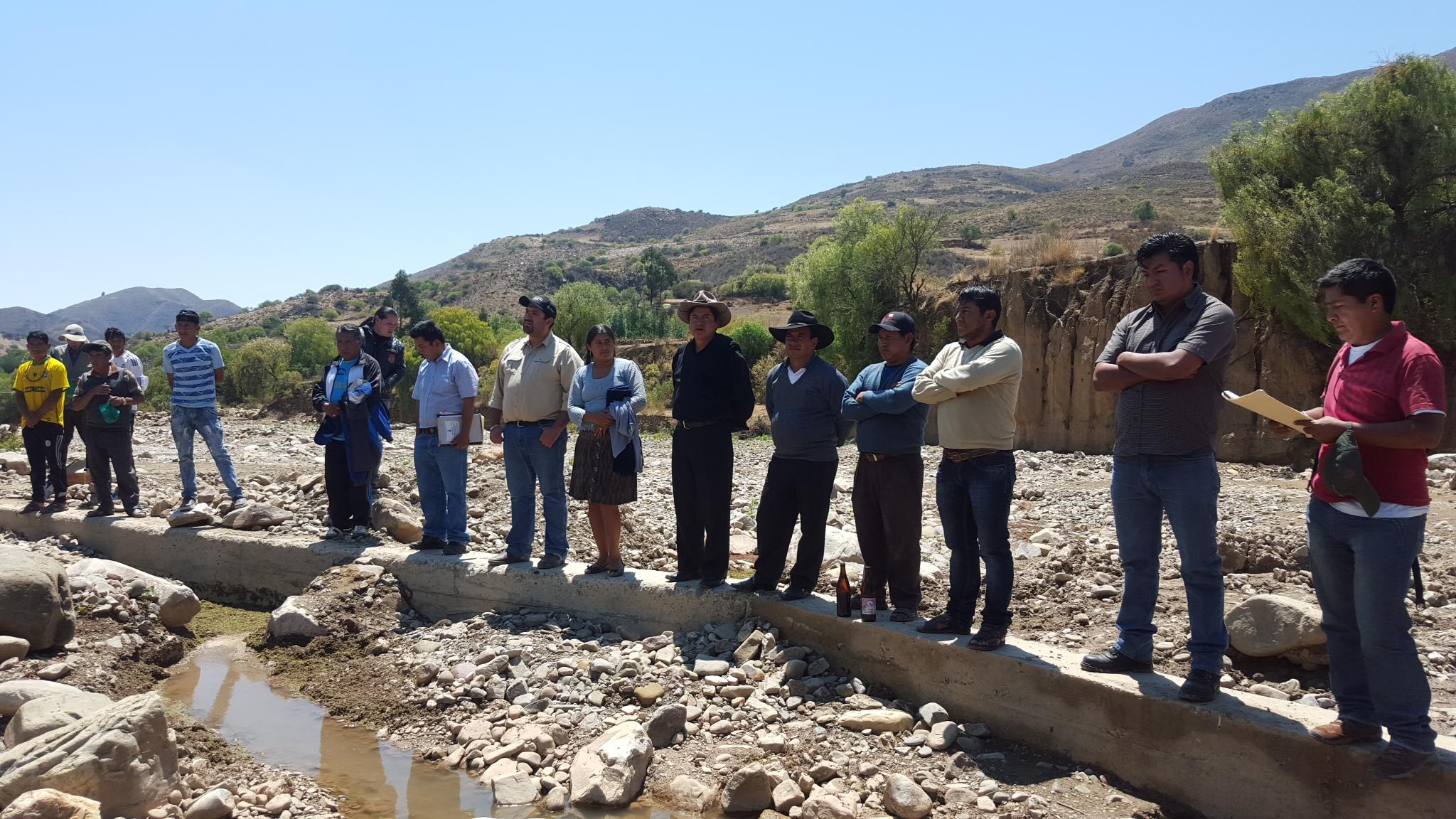
El Programa de Apoyo al Riego Comunitario entrega dos obras de riego en la comunidad de San Antonio de Toca del municipio de Tarabuco
Wietse FRICKEL | 09/11/2016
Tarabuco, septiembre de 2016. En el mes de septiembre, el Programa de Apoyo al Riego Comunitario – PARC del Ministerio de Medio Ambiente y Agua, realizo la entrega definitiva de dos proyectos de riego en la comunidad de San Antonio de Toca del municipio de Tarabuco del departamento de Chuquisaca, con una inversión de más de 1,8 millones de bolivianos, co-financiado con recursos de donación del Reino de Bélgica y con recursos internos del Gobierno Autónomo Municipal de Tarabuco. En la comunidad de San Antonio de Toca, el 22 de septiembre de dio por entregadas las obras de: “Ampliación Sistema de Microriego San Antonio de Toca Sector Alto” que incluye: Obra de toma, desarenador, pasarela y obras de arte y “Ampliación Sistema de Microriego San Antonio de Toca Sector Bajo”, que incluye: Mejoramiento de la obra de toma, revestimiento de canales, sifón construcción de un muro de protección. Los proyectos tienen como objetivo fortalecer y diversificar la dieta alimentaria de las 90 y 52 familias respectivamente y beneficiarias mediante la incorporación de frutales, aumentar la cantidad de las cosechas en 42.7 hectáreas y garantizar la alimentación suficiente de todos los miembros de las familias beneficiadas. Además de la infraestructura, los 2 proyectos de riego cuentan con supervisión externa y el servicio de un profesional en Acompañamiento y Asistencia Técnica (A/AT). Este profesional A/AT apoya a los regantes durante las fases de construcción y post-construcción en temas de organización social, relacionamiento con la empresa constructora, derechos de agua, operación y mantenimiento, producción parcelaria, comercialización y el establecimiento de alianzas estratégicas entre otras actividades. De esta manera, el servicio A/AT asegura la sostenibilidad de los proyectos integrales de riego comunitario del PARC.
-
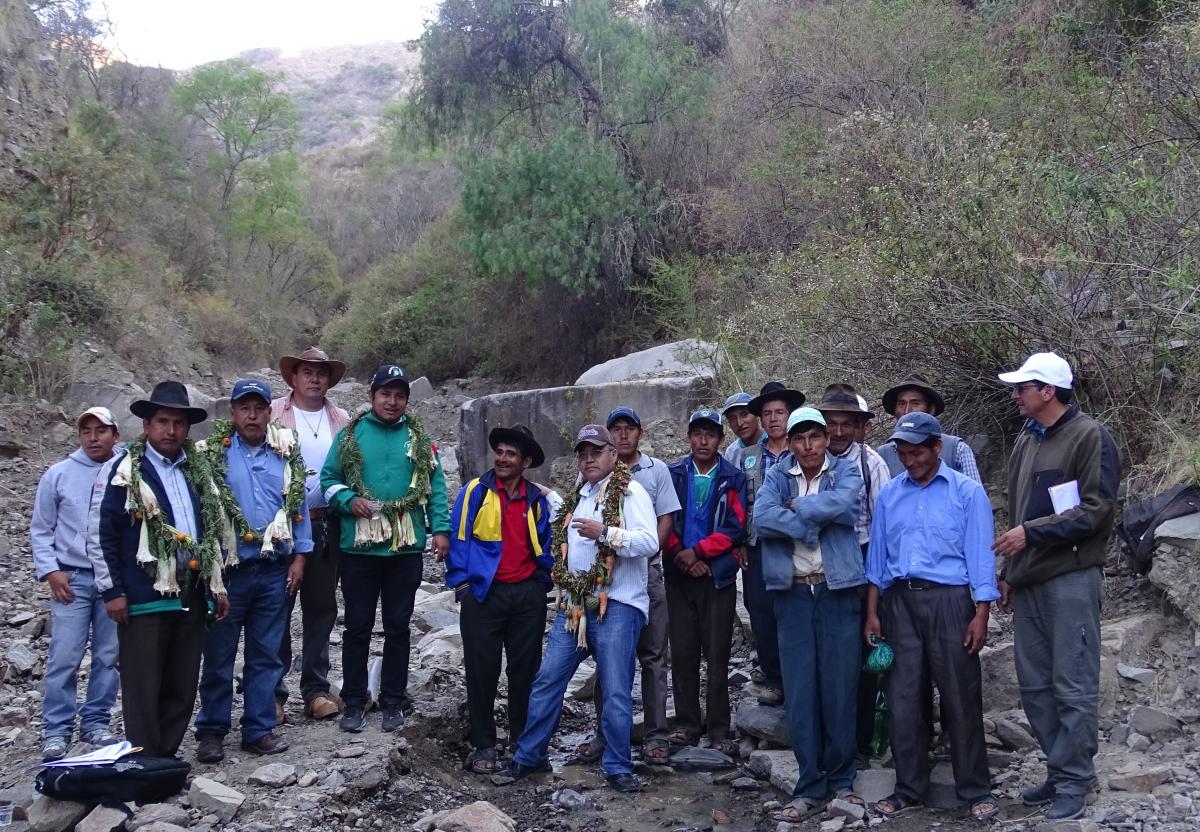
El Programa de Apoyo al Riego Comunitario y el Ministerio de Medio Ambiente y Agua empiezan la construcción de un sistema de microriego en la comunid
Wietse FRICKEL | 09/11/2016
Presto, septiembre de 2016. El Programa de Apoyo al Riego Comunitario (PARC) del Ministerio de Medio Ambiente y Agua (MMAyA) de Bolivia, inauguró el inicio de la construcción del Proyecto Integral de Riego Comunitario (PIRC) “Construcción Sistema de Microriego Comunidad de Molani” en el municipio de Presto del departamento de Chuquisaca, con una inversión de más de 1 millón de bolivianos, co-financiado con recursos de donación del Reino de Bélgica, con recursos internos del Gobierno Autónomo Municipal de Presto. El proyecto integral de riego comunitario garantiza el agua para 16 familias e incluye la construcción de un sistema de microriego, una obra de toma en el rio Palmito Huayqo, una red de conducción principal de longitud de 2171 m y una red de distribución de 2247.45 m. El sistema asegura la cosecha de las parcelas de producción agrícola, ofertando agua de riego en los meses donde falta este. Asimismo incrementarán los rendimientos agrícolas y los ingresos de los familiares en la zona, el proyecto aumentará la superficie de 28 hectáreas bajo riego. Asimismo, a través del técnico de Acompañamiento y Asistencia Técnica (A/AT), se fortalecerá la capacidad de gestión, tomando en cuenta aspectos de género para favorecer una mayor participación de las mujeres en las acciones del proyecto. De esta manera el proyecto integral de riego comunitario del PARC contribuirá a mejorar las condiciones de vida de las familias regantes. En el acto oficial de la inauguración de obra asestaron los beneficiarios, el dirigente de la comunidad Don Román Guarayo, el Presidente de Consejo Presto Xavier Zarate, el Alcalde Municipal José Luis Pérez, el fiscal y supervisor de la obra, el ingeniero Reynaldo Rocha en representación del Ministerio de Medio Ambiente y Agya y el ingeniero Orlando Espinoza, Director Nacional del programa PARC. El dirigente de la comunidad Román Guarayo dió el bienvenido y agradeció a las autoridades presentes: “Nosotros nos vemos contentos, porque aquí vemos los autoridades, financiadores, que vienen desde lejos, porque nosotros teníamos la necesidad. Vivimos en un lugar muy seco y ya no hay vida como antes, ya no llueve como antes, por esa razón juntándonos los beneficiarios y hemos presentado un proyecto viendo aprovechar el agua de la quebrada, y este proyecto se ha aprobado. Gracias señor alcalde, gracias al ministerio y el programa PARC que financia.” También acentuó la necesidad por agua: ”Ojalá que se termine bien este proyecto, esperamos cambiar en la parte productivo, si no hay agua se sufre, incluso los animales, nuestras plantas no crecen cuando no hay agua, ahora con el proyecto vamos producir Chirimoya y otros cultivos, porque este lugar es valle, casi no hay heladas cual es una ventaja para empezar a cultivar desde mayo podemos cultivar para cosechar en septiembre, porque no hay helada y vemos que aquí está la empresa y estamos presto para poner nuestra contraparte y sabemos cuáles son nuestras contrapartes y estamos de acuerdos.” El representante de la empresa constructora comprometió de terminar el proyecto en menos del tiempo del contrato: “Nosotros como empresa tenemos un compromiso de llevar este proyecto adelante en menos del tiempo del contrato, lo único que nosotros que esperamos de parte de la comunidad es un apoyo completo, una coordinación para poder llevar adelante este proyecto. También este proyecto está apoyado por supervisión, ATI, y esperamos también el mismo apoyo para llevar adelante lo más adelante posible el proyecto.” El ingeniero Reynaldo Rocha, en representación del Ministerio de Medio Ambiente y Agua, indicó: “Hoy es un gran día hermanos y hermanas. Efectivamente es un gran día porque están tienen un proyecto que les va en lo posterior ayudar, a mejorar tal vez sus condiciones de vida, mejorar la producción, de esta manera que se puede apoyar a sus hijos. Hoy en día los proyectos es bien difícil gestionar y conseguir financiamiento. Ustedes tienen la suerte de tener un alcalde que gestiona, y sin el ingeniero Orlando, sea mucho tiempo para concretar este proyecto. Creo que ustedes tienen un contraparte, el municipio tiene un contraparte, entonces lo que corresponde es trabajar como un equipo, todos juntos, nos toca como beneficiarios para animarlos, para que avanza, os si la empresa o la asistencia técnica ven que ustedes son sin fuerza, también corresponde a animar a ustedes, para que terminamos antes de prevista, para terminar antes de que las lluvias vengan en diciembre”. El representante terminó su discurso con un fuerte saludo de la Ministra Moreira y el Viceministerio Ortuño a la comunidad de Molani. El Director Nacional del programa PARC puso énfasis en tres puntos durante la inauguración. Los recursos; “la suma de más de 1 millón de bolivianos, que incluye supervisión, ATI y infraestructura, viene de un convenio que el gobierno boliviano ha firmado con el Reino de Bélgica. El PARC es un proyecto del MMAYA, que canalice los recursos para este municipio. Y la contraparte viene de ustedes, la comunidad, y el municipio.” El trabajo en equipo y el A/AT; “Más allá de ver papel, aquí tiene que haber trabajo en equipo, con fianza. Tiene que haber de parte de ustedes un seguimiento. Todos tenemos que apuntar al objetivo común, que es esta obra. Y eso depende de ustedes.” “Se van a capacitarles, formar un comité de riego, Hasta ahora ustedes no han regado. Por eso hay el ATI, para formar a ustedes. Más pronto que hacemos la entrega, más tiempo vamos a tener aprender gestionar el sistema de riego. Porque hay que saber cómo van a regar, cuantos horas van a regar, que cultivos, etcétera...” “Finalmente punto tres, es agradecerles a ustedes. Por su tiempo, por su energía, les agradezco por su invitación, me alegre, visitar.” El alcalde municipal Lic. Iber Meras Durán concluyó la inauguración de la obra agradeciendo al ministerio, el programa PARC, y las comunidades, para su energía, la construcción de proyectos y el entusiasmo para traer agua a la zona.
-
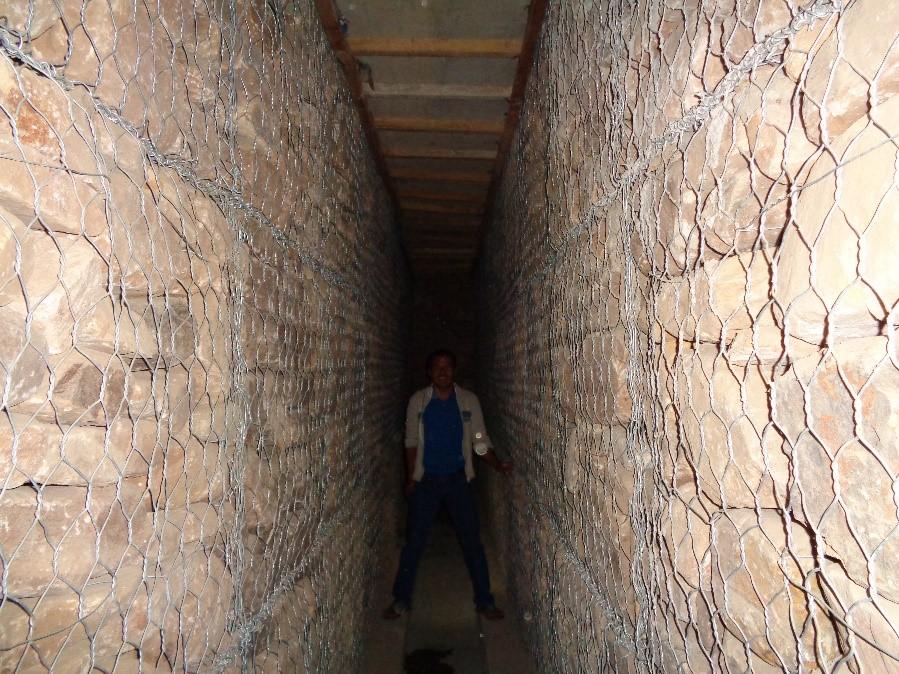
El Programa de Apoyo al Riego Comunitario garantiza el agua para riego de 66 familias en la comunidad de Aguada, municipio de Pasorapa
Wietse FRICKEL | 09/11/2016
Cochabamba, 26 de agosto de 2016. El Programa de Apoyo al Riego Comunitario (PARC), ejecutado a través del Ministerio de Medio Ambiente y Agua (MMAyA) y la Cooperación Técnica Belga, entregó el pasado viernes 26 de agosto del año en curso, un sistema de microriego en la comunidad de La Aguada, municipio de Pasorapa del departamento de Cochabamba. La obra demandó una inversión de más de 850 mil bolivianas, co-financiado por la donación del Reino de Bélgica y el Gobierno Autónomo Municipal (GAM) de Pasorapa. El sistema de microriego consiste en la construcción de una galería filtrante, ubicada sobre el río Aguada, un tanque de regulación y distribución de caudales a tres brazos del sistema, garantizando agua de riego para 105 hectáreas incrementales. Además, en el marco del programa PARC, la comunidad contará con un Asistente Técnico durante 8 meses para apoyar y capacitar a las familias para la realización de la operación y mantenimiento del sistema de riego. En la entrega de la obra participaron representantes del Gobierno Autónomo Municipal de Pasorapa, del Ministerio de Medio Ambiente y Agua, del comité de riego de la comunidad y representantes de la empresa constructora. En el acto, el dirigente de la comunidad La Aguada, Bernabé Sandoval, expresó su agradecimiento a todas las personas invitadas, dando por inaugurado el acto de entrega y dar la palabra al presidente del comité de riego. El presidente del comité de riego dió la bienvenida a los presentes y expreso lo siguiente: “……..para nosotros es un honor tener a nuestras autoridades para agradecerles todos los esfuerzos que han puesto para hacer esta obra, que es de gran envergadura para nosotros, es de gran beneficio, en lo posterior será la fuente fundamental del progreso de esta comunidad……….lo más importante esta vez es el cambio de mentalidad, de entrar por ejemplo con riego que va a vida no solamente a esta comunidad, sino a otras comunidades………cuando las personas están bien alimentadas hay ganas para estudiar, para trabajar, al final de cuentas uno sobresale con el esfuerzo necesario que lo hace...”, término agradeciendo a todas las autoridades. El Consejal del GAM Pasorapa Dr. Norman Arandia manifestó su agradecimiento al MMAyA, por el apoyo recibido y que de ahora en adelante los beneficiarios podrán producir para la seguridad alimentaria hortalizas no solo para los beneficiarios, sino para toda la población de Pasorapa que consume hortalizas que se trae del municipio de Aiquile para la venta cada fin de semana, para lo cual todavía se cuenta con el acompañamiento técnico del ATI. El Asambleísta por la provincia Campero Edilberto Soto manifestó sus saludos a todos los invitados, su alegría por el proyecto que traerá mucho beneficio, entre ellos para cultivar hortalizas, su agradecimiento al Ministerio correspondiente y recomendaciones a los beneficiarios para que lo cuiden y dure muchos años. Finalmente, el representante del MMAyA, agradeció al Gobierno Nacional, al GAM de Pasorapa y al Reino de Bélgica que co-financiaron el proyecto. Exhortó les regantes a mantener y cuidar las obras durante sus operaciones.
-

Video - Programa de apoyo a la gestión local de los servicios de salud, agua potable y saneamiento
Guido COUCK | 09/11/2016
El objetivo general del programa es de contribuir al bienestar de la población en las provincias del norte del país a través del mejoramiento del acceso a servicios básicos de salud, agua y saneamiento en las provincias de Carchi, Imbabura, Esmeraldas y Manabí.Específicamente se quiere mejorar el acceso de la población a una atención de salud integral yde calidad y mejorar los servicios de agua potable y fortalecer la gestión sanitaria.
-

Focus on coordination: Digital talk on Maisha Bora’s M&E tools
Toon DRIESEN | 07/11/2016
On 28 October Toon Driesen, Junior Assistant for BTC, presented Maisha Bora’s digital M&E tools at BTC headquarters in Brussels. A Digital Talk about hardware and software but foremost about the practical implications of dealing with digital tools and data in development programmes. In the Maisha Bora programme in Northern Tanzania BTC staff have set-up a range of digital tools for monitoring and evaluating their multi-actor food security programme. BTC introduced tablets, web surveys, a cloud-based server and data management tools based on the free and open source solutions offered by OpenDataKit, KoboToolbox and Public Tableau. Six months after introducing this integrated data and knowledge management system and extensively training local government officers, BTC is taking stock of their digital journey so far. The first results are promising: the tools have proven to be very effective for collecting and analysing a wide variety of data, reacting fast on emerging issues and building capacity of local government partners to monitor and coordinate programmes effectively. More information on www.maishabora-tz.org
